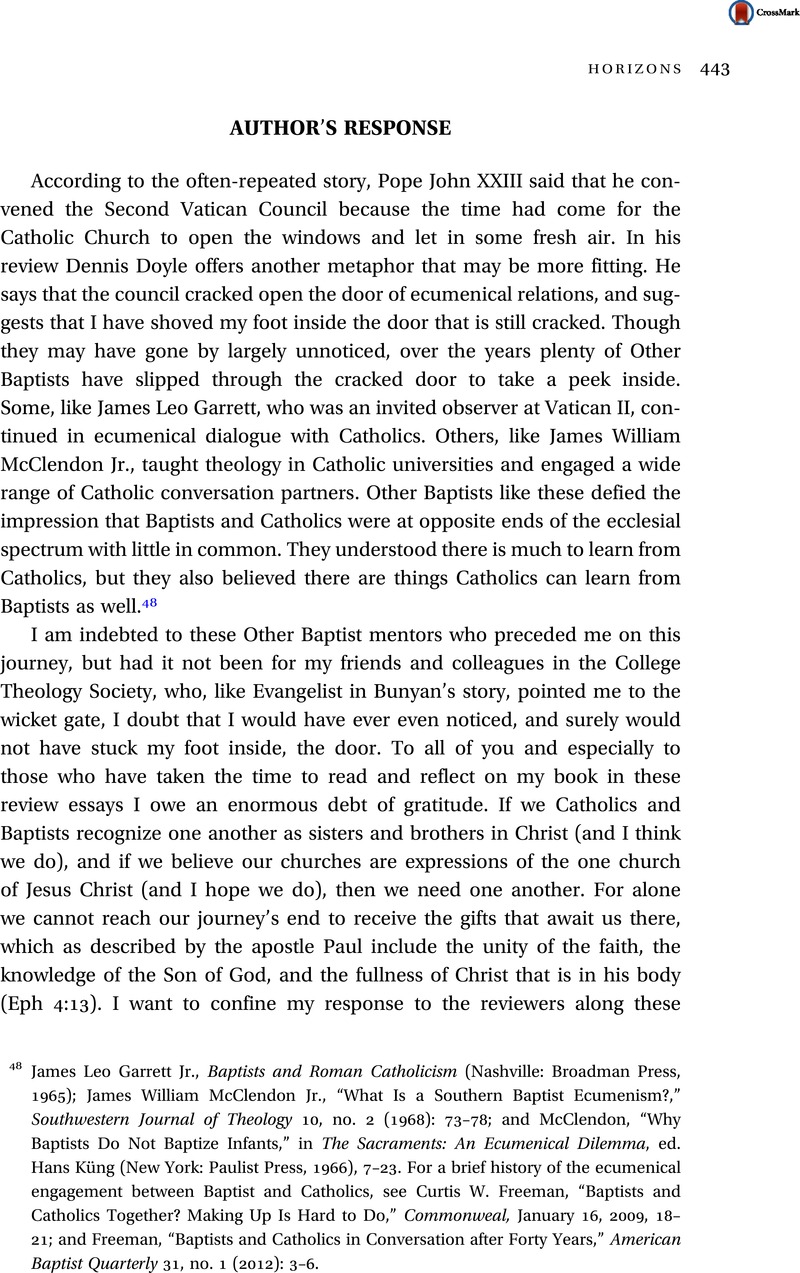No CrossRef data available.
Published online by Cambridge University Press: 23 November 2015

48 James Leo Garrett Jr., Baptists and Roman Catholicism (Nashville: Broadman Press, 1965); McClendon, James William Jr., “What Is a Southern Baptist Ecumenism?,” Southwestern Journal of Theology 10, no. 2 (1968): 73–78Google Scholar; and McClendon, “Why Baptists Do Not Baptize Infants,” in The Sacraments: An Ecumenical Dilemma, ed. Hans Küng (New York: Paulist Press, 1966), 7–23. For a brief history of the ecumenical engagement between Baptist and Catholics, see Curtis W. Freeman, “Baptists and Catholics Together? Making Up Is Hard to Do,” Commonweal, January 16, 2009, 18–21; and Freeman, “Baptists and Catholics in Conversation after Forty Years,” American Baptist Quarterly 31, no. 1 (2012): 3–6Google Scholar.
49 Kevin P. Emmert, “New Poll Finds Evangelicals’ Favorite Heresies,” Christianity Today, October 28, 2014, http://www.christianitytoday.com/ct/2014/october-web-only/new-poll-finds-evangelicals-favorite-heresies.html.
50 I outline such a strategy in my essay “Back to the Future of Trinitarianism?,” in Theology in the Service of the Church: Essays Presented to Fisher H. Humphreys, ed. Timothy George and Eric F. Mason (Macon, GA: Mercer University Press, 2008), 36–61. See the final section, “Toward a Trinitarian Ressourcement among Baptists,” especially points 4 and 5.
51 One prominent example of this is the work of Baptist/Evangelical theologian Robert E. Webber, Ancient-Future Faith: Rethinking Evangelicalism for a Postmodern World (Grand Rapids, MI: Baker, 1999). See also Webber, Ancient-Future Evangelism: Making Your Churches a Faith-Forming Community (Grand Rapids, MI: Baker, 2003); Ancient-Future Time: Forming Spirituality through the Christian Year (Grand Rapids, MI: Baker, 2004); Ancient-Future Worship: Proclaiming and Enacting God's Narrative (Grand Rapids, MI: Baker, 2008). Webber's influence continues through the Robert E. Webber Institute for Worship Studies, https://iws.edu/.
52 Cyprian, Epistle 72.21, in The Ante-Nicene Fathers (Grand Rapids, MI: Eerdmans, 1979), 5:284.
53 Kevin J. Vanhoozer, The Drama of Doctrine:A Canonical Linguistic Approach to Christian Doctrine (Louisville, KY.: Westminster/John Knox, 2005), 154. Vanhoozer argues that Scripture and tradition are rightly hermeneutically joined, but he contends that “the church's proclamation is always subject to potential correction from the canon.” Thus he maintains that the text of Scripture must not be collapsed into the tradition of ecclesial interpretation and performance. Vanhoozer, The Drama of Doctrine, 152.
54 “The Word of God in the Life of the Church,” §§173–75.
55 Albert C. Outler, “Do Methodists Have a Doctrine of the Church?,” in The Doctrine of the Church, ed. Dow Kirkpatrick (Nashville: Abingdon, 1964), 11–28.
56 Rite of Christian Initiation of Adults, study edition (Washington, DC: United States Catholic Conference, 1988).
57 Malcolm O. Tolbert, Shaping the Church: Adapting New Testament Models for Today (Macon, GA: Smyth & Helwys, 2003), 60; cited in Freeman, Contesting Catholicity, 365.